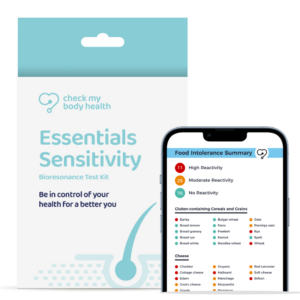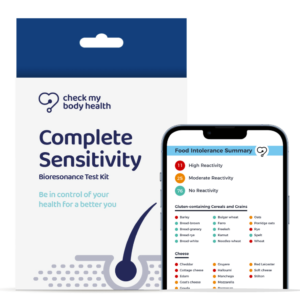
Medically reviewed by GP Gareth James MBBS, DFFP, DRCOG, MRCGP on December 3, 2023. To give you technically accurate, evidence-based information, content published on the Check My Body Health blog is reviewed by credentialed professionals with expertise in medical and bioscience fields.
Feeling tingling in your hands and feet can be strange and not so comfy. It’s like when your hand or foot ‘falls asleep’ or gets those pins-and-needles sensations. There are a few reasons for this, like not having enough vitamins. In this guide, we’ll talk about tingling in your hands and feet, how vitamins are involved, and what causes it. We’ll focus on B-vitamins and how they help stop the tingling. So, let’s explore why your hands and feet might feel tingly.
What is Paresthesia?
Before we talk about specific vitamin deficiencies causing tingling, it’s important to understand a phenomenon called paresthesia. Paresthesia involves abnormal sensations like tingling, numbness, or a ‘pins and needles’ feeling on the skin. While it can happen in any body part, it’s often felt in the hands and feet.
Paresthesia can result from various factors, including nerve damage, compressed nerves, and certain medical conditions. Among these factors, vitamin and mineral deficiencies play a role by affecting nerve function, leading to unusual sensations in the extremities.
What are the symptoms of Paresthesia?
Paresthesia shows up in different ways. People who have it might explain their feelings in various ways. Common symptoms of paresthesia include:
- Tingling Sensation: The main thing with paresthesia is feeling a tingling or prickling now and then or all the time.
- Numbness: Paresthesia might make an area feel numb for a little while or a long time.
- Burning or Itching: Some folks with paresthesia might also feel burning or itching along with the tingling.
- “Pins and Needles”: When blood flow to an area is not great, paresthesia might give you a sensation like “pins and needles.”
Now that we know a bit about paresthesia. Let’s look at how not having enough of certain vitamins and minerals might make your hands and feet tingle.
Vitamin and mineral deficiencies that can cause tingling in hands and feet
Several vitamin and mineral deficiencies can contribute to tingling sensations in the hands and feet:
- Vitamin B12 Deficiency: This is a big one. Not having enough B12 can lead to nerve damage, causing tingling and numbness. Foods like meat, fish, and dairy are good sources.
- Vitamin B6 Deficiency: When you’re low on B6, your nerves can get a bit wonky, leading to tingling. Foods like poultry, bananas, and potatoes can help.
- Vitamin B1 (Thiamine) Deficiency: Thiamine plays a role in nerve function. Without enough, you might experience tingling. Whole grains and beans are good thiamine sources.
- Vitamin E Deficiency: Though less common, low vitamin E can impact nerve health, possibly causing tingling. Foods like nuts, seeds, and spinach can boost your vitamin E intake.
- Calcium Deficiency: Not having sufficient calcium can affect nerve signals, leading to tingling. Dairy products, leafy greens, and fortified foods can provide calcium.
- Magnesium Deficiency: Low magnesium levels may contribute to nerve issues and tingling. Foods like nuts, seeds, and leafy greens are magnesium-rich.
- Potassium Deficiency: Potassium is crucial for nerve function, and low levels might result in tingling. Bananas, oranges, and potatoes are good potassium sources.
To keep your hands and feet happy, it’s important to maintain a balanced diet with these essential nutrients. If you suspect any deficiencies, consulting with a healthcare professional for personalised advice is recommended.
Foods with B-vitamins
Now that we’ve looked at how not having enough vitamins can make your hands and feet tingle, let’s talk about foods that can help. B-vitamins are super important for your nerves, and you can find them in certain foods. Check out these tasty options:
- Vitamin B12: Get it from meat, fish, dairy, and cereals with added vitamins.
- Vitamin B6: Poultry, bananas, potatoes, and cereals with added vitamins are great for your nerves too.
- Vitamin B1 (Thiamine): Whole grains, beans, peas, and nuts have thiamine, which helps your nerves stay in top shape.
Eating these foods can keep your nerves happy and might stop your hands and feet from tingling. It’s like giving your body the right tools for the job!




